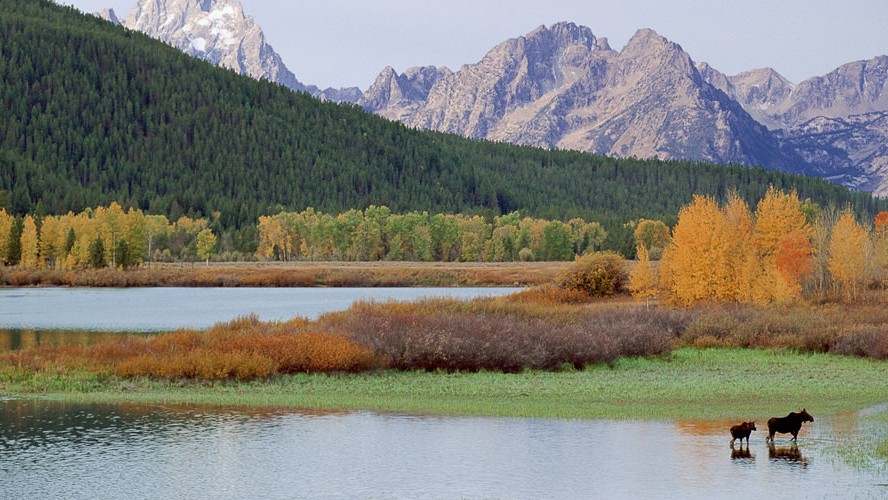World’s first zero waste adventure kicking off in Yellowstone National Park
The ambitious project will aim to fit all waste and plastics produced from a 7-day Yellowstone safari into a single small container

Beginning July 6, 2019, America's first national park will be the setting for another historic innovation: the World's First Zero Waste Adventure, created by Natural Habitat Adventures (Nat Hab). Kicking off in Bozeman, MT and moving through the northern region of Yellowstone National Park this first-ever waste-conscious endeavor will attempt to divert (refuse, recycle, compost, upcycle, or re-use) 99 percent or more of all waste produced as part of Nat Hab-sponsored trip operations.* Fourteen travellers will participate, guided by two naturalist Expedition Leaders.
Natural Habitat Adventures, the conservation travel partner of World Wildlife Fund, designed the project in part to raise awareness of the role that plastic waste plays in even the most pristine and protected destinations such as Yellowstone.
"One way we're dedicated to protecting the planet is to inspire travelers to become more sustainable," said Nat Hab Founder & President Ben Bressler. "Our goal is to continually raise the bar on conservation, and this Zero Waste Adventure will show that it's possible to reduce our environmental impact while providing an exceptional experience for Yellowstone visitors."
The aim of the initiative is to fit all waste produced while in vehicles, lodges and camps throughout the Greater Yellowstone Ecosystem into a single small container at the end, nearly eliminating the need to send any materials to a landfill or incinerator. Trip leaders will encourage guests to refuse potential waste whenever possible, such as declining disposable straws, individually packaged condiments and single-use shampoo bottles, minimizing the waste they produce overall.
Nat Hab has devised various strategies to limit trash while in the park: providing travellers with a zero waste toolkit that includes personal reusable items such as water bottles, mugs, cutlery and tote bags; transporting packed meals in reusable containers; recycling single-use packaging, including hard-to-recycle items through TerraCycle; composting napkins and biodegradable food waste; and buying food in bulk. Waste reduction begins even before the trip starts, with travellers receiving digital versions of all pre-trip materials, including forms to complete and the daily itinerary.
While realizing this zero waste goal won't be easy, Nat Hab is committed to setting a new standard for Yellowstone National Park's tourism industry. By demonstrating that it is possible to operate a zero waste adventure, the company hopes to motivate the region's other tourism businesses to improve their own waste management practices and pursue similar innovations.
Nat Hab also wants its zero waste ethos to extend beyond Yellowstone. By inspiring its travellers and partners to make conscious choices about waste in their everyday lives and business practices, Nat Hab aims to create a long-lasting ripple effect. Given that the average American produces 4.4 pounds of trash per day, Nat Hab recognizes there's much room for improvement. When travellers witness the effectiveness of waste reduction on vacation, they learn how to reduce or eliminate disposables at home, too.
"We encourage the travel industry to follow Nat Hab's lead to mitigate its impact, protect the earth's precious natural resources, and educate travellers about how they can do their part," said Jim Sano, World Wildlife Fund Vice President, Travel & Conservation.
This groundbreaking project is the latest endeavor to further Nat Hab's legacy of leadership in ecotourism. In 2007, it became the world's first carbon-neutral travel company, and in May, the company announced it would offset the carbon emissions from all its guests' international flights as well. Nat Hab's carbon offset program has offset more than 34.5 million pounds of CO2 emissions generated on its global nature adventures.
The company is also dedicated to eliminating single-use plastic water bottles and straws on all its trips. Since 2014, Nat Hab has provided travellers with refillable stainless steel water bottles, replacing disposable plastic bottles across all operations. And it is currently achieving major strides in reducing the use of plastic straws. By August 2018, 67 percent of Nat Hab trips were plastic-straw-free, and the company is on target to eradicate plastic straws entirely by the end of 2019.
To learn more about The World's First Zero Waste Adventure, visit www.nathab.com/zerowaste.
* This does not include waste that involves personal hygiene items, poses safety risks, is legally required to be sent to a landfill, or results from guest actions outside of NHA's control (pre-trip, en route, items of a personal nature, etc.). Where waste is created as a part of a partner provider's service, ie: third-party hotels, we are encouraging guests to avoid it by providing other options.


